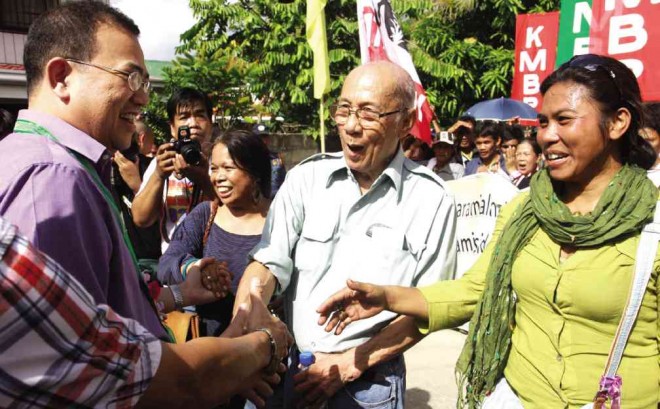
BONDOC Peninsula farmer-leader Maribel Luzara (right) meets Agrarian Reform Secretary Virgilio de los Reyes in a land distribution event in Mulanay town, Quezon province, in February 2013. Between them is human rights lawyer and former Quezon Rep. Oscar Santos. DELFIN MALLLARI JR./INQUIRER SOUTHERN LUZON
LUCENA CITY, Philippines—Tenants in a disputed estate in the Bondoc Peninsula in Quezon province can find reason to rejoice amid widespread “mourning” by farmer groups over the end of the government’s agrarian reform program.
The day before the Comprehensive Agrarian Reform Program (CARP) came to an end, Malacañang released an order junking the petition of owners of Hacienda Matias in San Francisco town to exempt the nearly 2,000-hectare estate from land reform.
The decision, dated June 9, was received on Sunday afternoon by Maribel Luzara, president of Kilusang Magbubukid ng Bondoc Peninsula (KMBP) and one of the tenants of Hacienda Matias.
Luzara said KMBP had mixed emotions over the Malacañang decision. “We’re glad that President Aquino has fulfilled one of his promises but at the same time, we are skeptical if the DAR (Department of Agrarian Reform) can really implement the decision,” Luzara said over the phone on Monday.
The decision, signed by Executive Secretary Paquito Ochoa Jr., said the office of the President “denied for lack of merit” the motion for reconsideration filed by the owners of Hacienda Matias.
Ochoa said the Office of the President found no reason to “modify or reverse” the earlier decision of the DAR, saying the arguments raised by the petitioner were a “mere rehash of matters already resolved.”
The landowners have long been petitioning to exempt the 1,736-ha Hacienda Matias from CARP, declaring the land a “cattle ranch.”
The estate’s owners brought the matter to Malacañang after the DAR denied on June 14, 2012, the application for exemption for lack of merit.
Luzara called on the President to order Agrarian Reform Secretary Virgilio de los Reyes to immediately distribute Hacienda Matias to its nearly 1,000 qualified tenants because even with the Palace decision, she said they expected the landowners and their workers to continue harassing the families of the tenants.
“President Aquino should act fast before it’s too late for us,” she said.
The Bondoc Peninsula has long been tagged a hotbed of agrarian conflict in Southern Tagalog, with vast landholdings in the towns of San Andres, San Narciso, San Franciso and Buenavista, which are controlled by a few landowners surnamed Reyes, Matias, Zoleta, Uy, Tan and Ausa.
Luzara noted that the
1,200-ha Hacienda Reyes had long been decided for distribution to its tenants but only 480 ha had actually been distributed in February last year.
Despite the favorable decision from Malacañang, Luzara said KMBP members would still mourn the demise of CARP by lighting candles and tying black ribbons by the doorsteps of their houses to symbolize the failure of the government’s land reform program.
The extended CARP ended Monday and Congress has yet to act on the President-certified urgent bill to extend anew the land reform program until 2016.
Jansept Geronimo, spokesperson of Kilusan para sa Tunay na Repormang Agraryo at Katarungang Panlipunan (Katarungan) Quezon, said Bondoc Peninsula farmers hung black and red ribbons by their doorsteps on Monday. “Black is because they are in mourning. Red symbolizes how they will still continue the struggle to own land,” he said.
Geronimo said KMBP members and the families of six peasant leaders killed in agrarian-related conflicts in the Bondoc Peninsula also paid tribute to their fallen comrades.